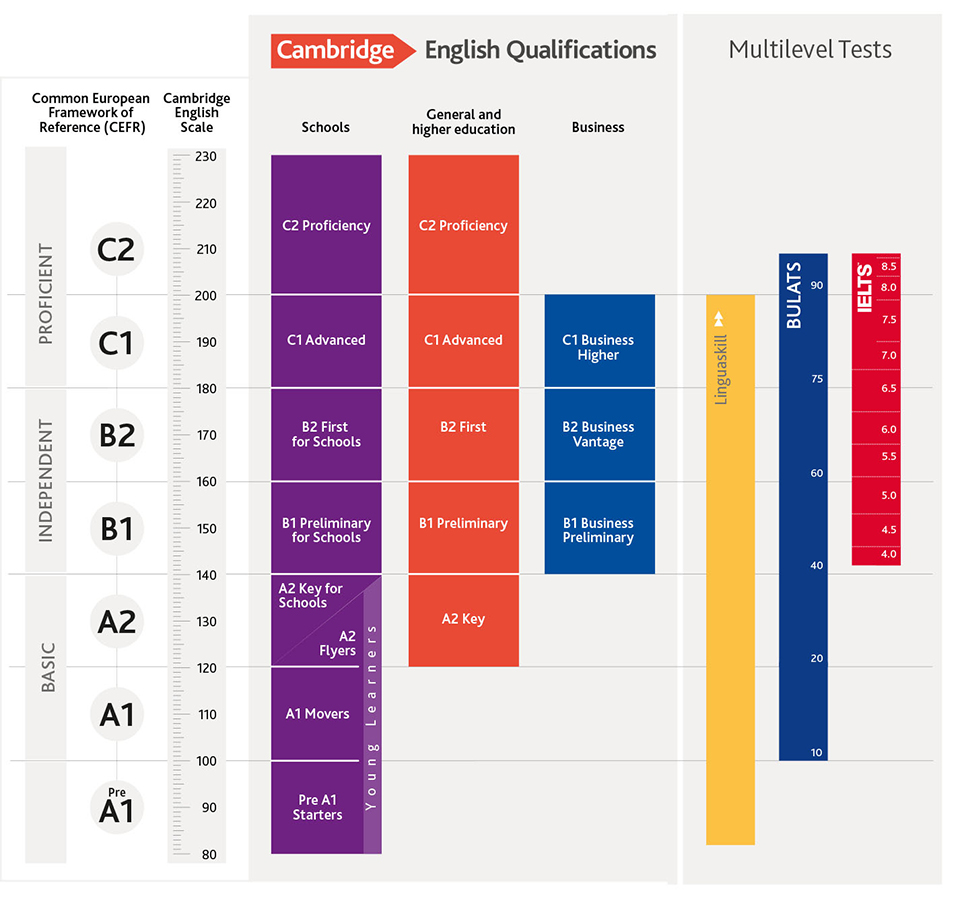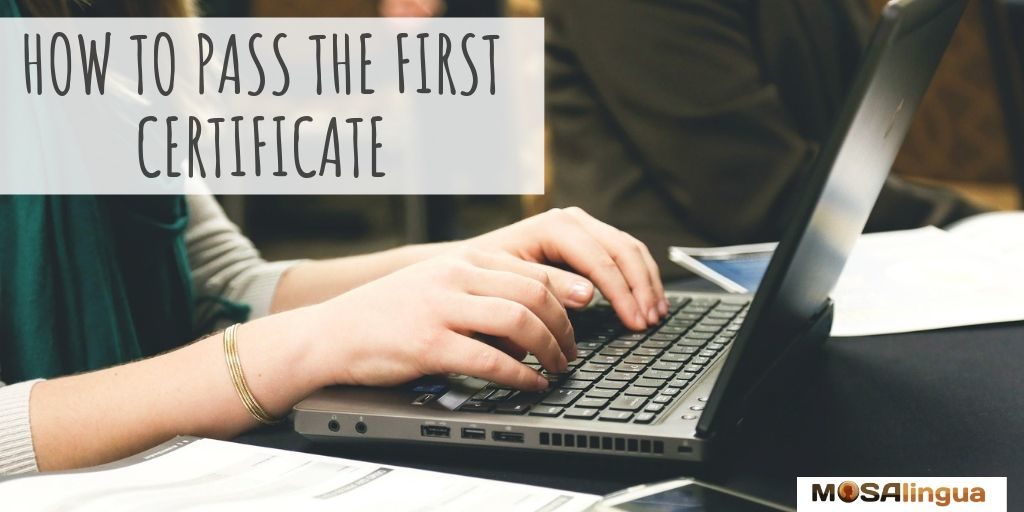The Cambridge B2 First Certificate (formerly known as Cambridge English: First (FCE)) is basically a test that proves you can live, study and work in an English-speaking country. So, if you are planning to move abroad, passing the First Certificate can help you find the best professional or educational opportunities in an English-speaking country. In this article, we talk about the key information you will need for the exam, and we give you some tips and tricks on how to prepare for it.
The Cambridge First Certificate: What and Why?
What’s the point?
The B2 First is one of a series of English exams and certification programs developed by Cambridge Assessment English, an affiliate of Cambridge University. B2 might look familiar to you. That’s because it’s one of the six levels of the Common European Framework of Reference for Languages. More on that in a minute…
What does the Cambridge B2 First Certificate test for? A passing score means that you should be able to:
- Communicate opinions and present good arguments when speaking with others
- Write clearly in English, provide detail, and explain the advantages and disadvantages of different points of view
- Write reports, short stories, reviews and other types of texts
- Read and understand the news.
Here’s a diagram that compares the different CEFR levels and the various tests offered by Cambridge English. As you can see, if you have a B2 level you are considered an independent language user by these standards. So, we think it’s a good level to aim for when learning a new language.

So what will the certificate do for you? Passing the exam has a lot of benefits. As you can see, some of the exams are more geared toward business, some are for students, and others are for the general public. Here are just a few advantages you’ll have if you pass:
- Having a language certification, and especially this one, means you will have more opportunities to work and study abroad. That’s because the Cambridge B2 First Certificate is accepted by over 22,000 universities, government institutions, and companies around the globe.
- It’s the best learning step to take between the B1 Preliminary (formerly Cambridge English: Preliminary (CEP)), for students with an intermediary level, and the C1 Advanced (formerly the Cambridge English: Advanced (CEA)) exam for students with an advanced level.
Tips to Help You Pass the Cambridge First Certificate
Practice English any chance you get
So you have decided that you want to take the test. How can you ensure that you get a good result? Aside from dedicated test prep, any kind of language immersion you can get will be a big help. For example, you could use the MosaLingua App for learning English. It was designed to help you learn and memorize key vocabulary and grammar for the exam. (By the way, if you’re taking the TOEFL or TOEIC exams instead of the Cambridge B2 First Certificate, we have special apps for those.)
There are many, many free online tools and resources to help you learn English. For example, we recommend watching TV series and movies in English for listening practice. You could even sing songs in English to improve your pronunciation. If you need some help choosing practice resources, check out this video by Cédric from the MosaLingua team:
Prepare for the test
In terms of the test itself, here are some tips for making sure you are as ready as possible:
- Know your current level. Is the B2 First exam definitely the one you should be taking? Make sure it’s not too easy or too hard before you sign up for a test date. Identify your weak spots and work on them in order to reach an upper-intermediate level, the requirement to pass the test and get your Cambridge B2 First Certificate. We wrote an article about some different ways you can figure out your English level, read it here.
- Practice at home with B2 First Certificate sample tests and questions, published by Cambridge. These practice tests can also help you decide if the B2 level is what you should aim for. You can download them or do them online.
- Plan out the time you think it will take to prepare for the exam. The amount of time it takes to prepare for the exam depends on each person. It can depend on how much time you have to study, and how much improvement you need to make. Or even how fast you learn.
- Give yourself a realistic goal, and follow a schedule that will help you work on it step by step. Have a look at the official prep material for the Cambridge First Certificate to help you with this process.
Know thy enemy
One more tip, which deserves its own section because it’s THAT important!
Familiarize yourself with how the exam is structured. That way, you’ll know what to expect for each section. Don’t wait until test day to be surprised!
- For example, you should know exactly how long you have to complete each section. That way you can time yourself when practicing to make sure you’re on the right track. You should also know things like how many times you’ll get to hear each recording for the listening section (twice, in case you were wondering!).
- And make sure you know how to fill in the answer sheets correctly. It would be silly to lose points or even fail just because you didn’t know that you have to use a pencil, not a pen, if you’re taking the test on paper.
- You should also learn about the scoring system and how the exams are graded. For example, it’s important to know that doing really well in one section can compensate for poor scores in another. That’s because they take the average of your scores on all four sections. We’re writing a series of articles about the four different sections of the test, so check back soon! Also, don’t be afraid to guess – you won’t lose any points for incorrect answers.
Am I Ready for the Cambridge First Certificate Exam?
How will you know when you’re ready for the exam? There is no way to know for sure that you are ready, other than taking the test. But there is some good news: you can take practice tests to see how ready you are. This way, you don’t risk taking the test and failing if you aren’t ready yet. When you can consistently to pass mock exams with a higher score than what you hope to achieve in the real exam, you are probably ready. Aim to achieve a bit higher in the practice test, because your nerves will probably kick in on exam day. Depending on your personality, they could cause you to get a lower score than the one you get at home.
We also have a free English level test to help you assess your level at home. It’s a quick, 20-question quiz that can give you an idea of your English reading and writing skills. If you score in the As, you probably shouldn’t take the B2 exam just yet. And if you score in the Cs, you can aim for a higher qualification.
Take our English level test
We put together a series of articles with key information about each section of the Cambridge First Certificate and techniques to pass each one of them.
- Learn more about the written portion of the test: How to Make Sure You’ll Pass the B2 First Writing Section
- Find out how to master the speaking section: Everything You Need to Know to Pass the Cambridge B2 First Speaking Section
- Conquer the reading section of the B2 exam: How to Pass the Reading and Use of English Section of the Cambridge B2 First Certificate
- And don’t forget to brush up on your listening skills: How to Pass the Listening Section of the Cambridge B2 First Exam
In the meantime, I hope the information we’ve shared in this article will be useful for you. And we’ll see you soon for more tips and tricks!





Comments